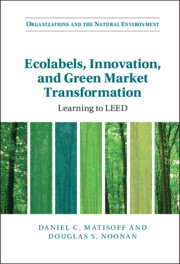Book contents
- Ecolabels, Innovation, and Green Market Transformation
- Organizations and the Natural Environment
- Ecolabels, Innovation, and Green Market Transformation
- Copyright page
- Dedication
- Contents
- Figures
- Tables
- Preface
- 1 Advancing a Perspective of Green Market Transformation
- 2 The Architecture of Green Building Policies and Practice
- 3 Choose Your Own Adventure!
- 4 The Labeling Building Challenge
- 5 The Public and Private Benefits of Green Building
- 6 Tossing a Pebble in a Pond
- 7 Demonstrating Innovation in Green Buildings
- 8 Keep Raising the Bar
- 9 It’s Not Easy Being Green
- 10 A Blueprint for Green Market Transformation
- 11 Conclusions
- Index
- References
7 - Demonstrating Innovation in Green Buildings
Catalyzing Market Transformation
Published online by Cambridge University Press: 27 October 2022
- Ecolabels, Innovation, and Green Market Transformation
- Organizations and the Natural Environment
- Ecolabels, Innovation, and Green Market Transformation
- Copyright page
- Dedication
- Contents
- Figures
- Tables
- Preface
- 1 Advancing a Perspective of Green Market Transformation
- 2 The Architecture of Green Building Policies and Practice
- 3 Choose Your Own Adventure!
- 4 The Labeling Building Challenge
- 5 The Public and Private Benefits of Green Building
- 6 Tossing a Pebble in a Pond
- 7 Demonstrating Innovation in Green Buildings
- 8 Keep Raising the Bar
- 9 It’s Not Easy Being Green
- 10 A Blueprint for Green Market Transformation
- 11 Conclusions
- Index
- References
Summary
This chapter develops a theory to explain how demonstration projects can help facilitate transformation in the marketplace. This theory is based primarily on a single economic concept: The costs of acquiring and utilizing new information. Understanding the role that pilot and demonstration projects can play in disseminating information is crucial to understanding the prospects for market transformation. These information flows occur both on the supply side and demand side of the (building) technologies market. This chapter details how information flows across supply networks and throughout markets can eventually shift standard operating practices, though these results are hardly guaranteed. We speculate that geographic networks and communities of practice are largely responsible for leveraging information spillovers, lowering costs, and facilitating dissemination of innovative technologies.
Keywords
- Type
- Chapter
- Information
- Ecolabels, Innovation, and Green Market TransformationLearning to LEED, pp. 182 - 209Publisher: Cambridge University PressPrint publication year: 2022



